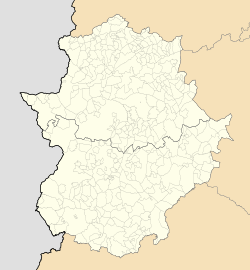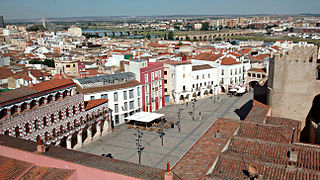
Badajoz is the capital of the Province of Badajoz in the autonomous community of Extremadura, Spain. It is situated close to the Portuguese border, on the left bank of the river Guadiana. The population in 2011 was 151,565.

Mérida is a city and municipality of Spain, part of the Province of Badajoz, and capital of the autonomous community of Extremadura. Located in the western-central part of the Iberian Peninsula at 217 metres above sea level, the city is crossed by the Guadiana and Albarregas rivers. The population was 60,119 in 2017.

The province of Badajoz is a province of western Spain located in the autonomous community of Extremadura. It was formed in 1833. It is bordered by the provinces of Cáceres in the north, Toledo, Ciudad Real in the east, Córdoba in the south-east, Seville, and Huelva in the south and Portugal in the west.

Trujillo is a municipality located in Extremadura, an autonomous community of Spain in the Province of Cáceres. In 2013 the municipality had 9,086 inhabitants. Originally settled on a granite knoll, which was readily fortified, the town now extends to the southeast of its original site. Trujillo is both a centre for tourism, with more than 25 hotels, and a regional market town.
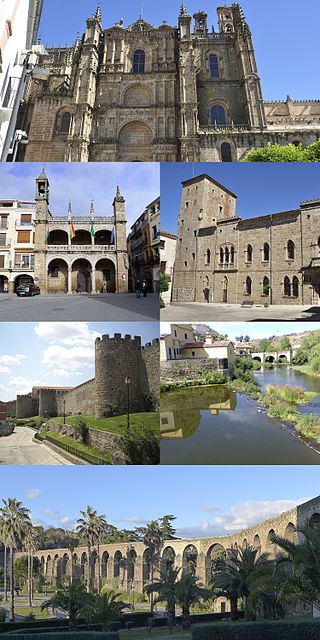
Plasencia is a walled market city in the province of Cáceres, Extremadura, Western Spain. As of 2013, it has a population of 41,047.

Juan Yagüe y Blanco, 1st Marquis of San Leonardo de Yagüe was a Spanish military officer during the Spanish Civil War, one of the most important in the Nationalist side. He became known as the "Butcher of Badajoz" because he ordered thousands killed, including wounded Republican soldiers in the hospital.

Fuendetodos is a town in the Campo de Belchite comarca (county), in Aragon, Spain, located about 44 kilometers south-east of Zaragoza. As of 2011, it had a population of approximately 178.

Calatrava, officially the Municipality of Calatrava, is a 5th class municipality in the province of Romblon, Philippines. According to the 2020 census, it has a population of 11,342 people.

Romblon, officially the Municipality of Romblon, is a 3rd class municipality and capital of the province of Romblon, Philippines. According to the 2020 census, it has a population of 40,554 people. The archipelagic municipality is the capital of the province of Romblon and the seat of its provincial government. It includes Romblon Island as well as the nearby islands of Lugbon, Alad and Cobrador.
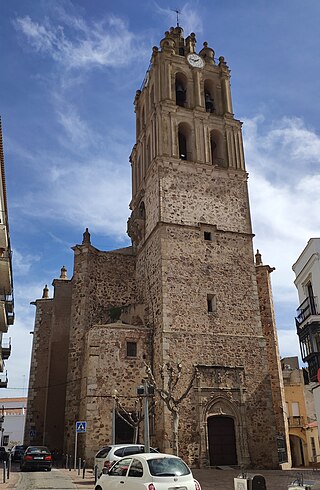
Almendralejo is a town in the Province of Badajoz, Extremadura, Spain. It is situated 45 km south-east of Badajoz, on the main road and rail route between Mérida and Seville. As of 2010, it has a population of 33,975. It was the site of a battle and massacre in 1936 during the Spanish Civil War.
The Battle of Badajoz was one of the first major engagements of the Spanish Civil War, resulting in a tactical and strategic Nationalist victory, however at a significant cost in time and troops. After several days of shelling and bombardment, Nationalists stormed the fortified border city of Badajoz on August 14, 1936, cutting off the Spanish Republic from neighbouring Portugal and linking the northern and southern zones of Nationalist control.

La Solana is a municipality in Ciudad Real, Castile-La Mancha, Spain. It has a population of 15,340. It has a very arid climate. It is located in a zone of Spain that produces large quantities of wine and olive oil.

Pueblonuevo del Guadiana, also shortened as Pueblonuevo, is a Spanish town and municipality in the province of Badajoz, Extremadura. It has a population of 2,046 and an area of 30,95 km².
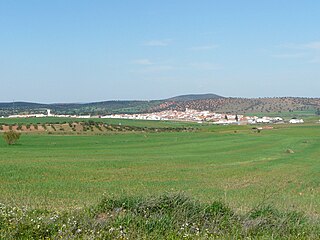
Retamal de Llerena is a municipality located in the province of Badajoz, Extremadura, Spain. According to the 2008 census (INE), it has a population of 497 people.

Llerena is a municipality located in the province of Badajoz, Extremadura, Spain. According to the 2007 census (INE), the municipality had a population of 5,995 inhabitants. Llerena, a town that declared itself a Historical Artistic gathering on December 29, 1966, is located in southwestern Spain. The head of the judicial and economic center of the region of the country of the same name, it is equidistant from 20 municipalities, and sits at the confluence of the District 432 and 413 National Roads.

The Badajoz massacre occurred in the days after the Battle of Badajoz during the Spanish Civil War. Between 500 and 4,000 civilian and military supporters of the Second Spanish Republic were murdered by the Nationalist forces after the seizure of the town of Badajoz on August 14, 1936.

Segura de León is a Spanish municipality in the province of Badajoz, Extremadura. It has a population of 2,170 (2007) and an area of 106 km2. It belongs to the comarca of Tentudía.

Jesús Delgado Valhondo was a Spanish poet.
Guadiana, is a Spanish town and municipality of the Province of Badajoz, in the autonomous community of Extremadura. The municipality covers an area of 30.05 square kilometres (11.60 sq mi) and as of 2015 had a population of 2,527 people.

Antonio Rodríguez Osuna is a Spanish politician, serving as Mayor of Mérida since 2015. A member of the Spanish Socialist Workers' Party (PSOE), he was member of the Assembly of Extremadura from 2011 to 2015.

